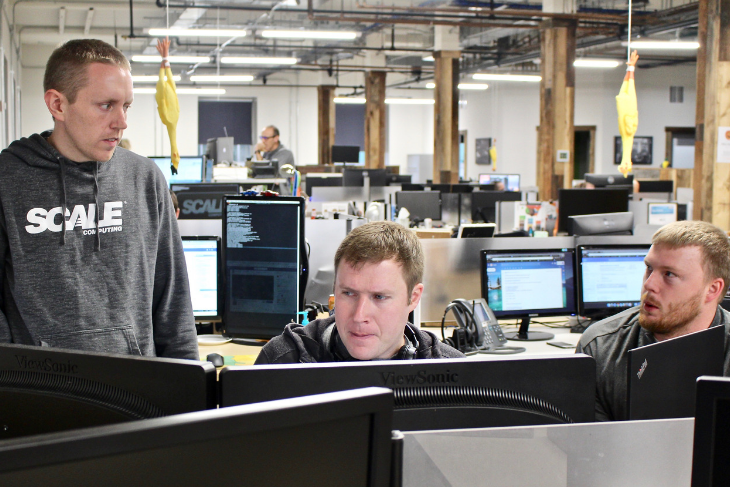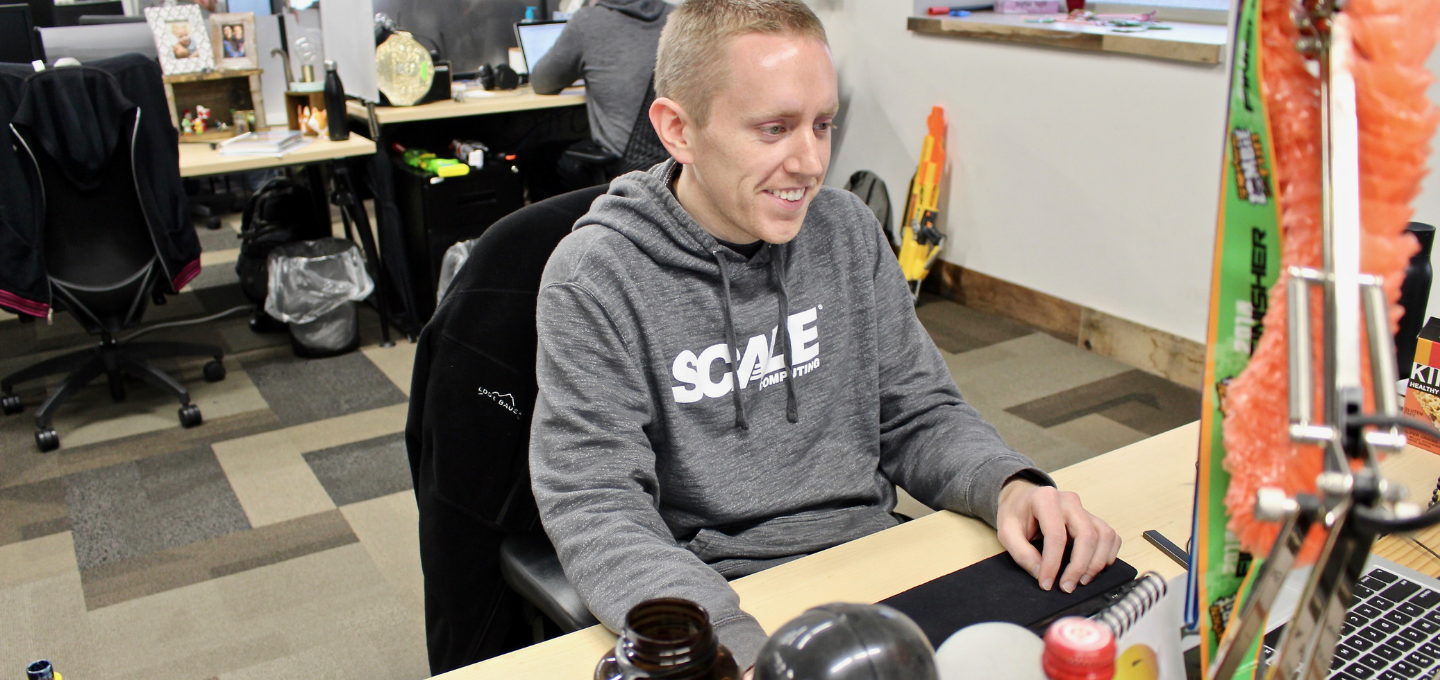Meet Blake Rodier, Technical Support Manager at Scale Computing
Employer: Scale Computing
Job Title: Technical Support Manager
Degree Path: Bachelors Degree from Robert Morris University, A+, MCP Certifications
Hometown: Springfield, IL
City: Indianapolis, IN
What led you to your getting into tech and support? What was your first job in tech?
I really enjoyed gaming, so getting into building my own PC was one of my first entries into tech. I’m also going to date myself here but I really enjoyed TechTV and used to watch “The ScreenSavers” and loved learning about new technology that was out there, as well as some of the web shows from Kevin Rose like “thebroken.” I new pretty early on that I wanted to pursue a career in technology and took a Cisco Certified Network Associate (CCNA) course in high school before going to college with a focus in computer studies.
My first real job in tech was at Telamon in Indianapolis. I worked on a help desk that supported a number of different clients, but the major one was Iomega who is famous for the Zip drives (again…I’m old). I primarily supported their NAS and storage systems and it was a great introduction into technical customer service, which is my passion.
What has been your career path so far?
I first worked at Telamon as a help desk analyst where I primarily supported Iomega. I was excited to have my first role in technology. I worked my way from a Tier 1 to a Tier 3 on the team during my time there, but ultimately the technology I was supporting didn’t continue to excite me and I decided to find a new position.
I then worked at UnitedHealthOne, which purchased Golden Rule Insurance where they contracted their IT staff through PCM. I worked as a help desk technician and did internal technical support for the employees of the company. This was exciting because I got a lot more experience with enterprise technologies and a much wider array of issues. While working there I found the culture wasn’t a great fit for me and I didn’t like the hierarchy of a large company. Through the merger with UnitedHealthCare there were also some changes coming down in their IT structure that I felt may impact my job so I decided to begin looking for a new opportunity.
Ultimately I landed at Scale Computing in April of 2013 and have been there ever since. I started as a Tier 1 Support Engineer and worked my way up through the ranks to a Tier 3. I had always been sort of the right hand man of my manager and was always helping with managerial tasks in my previous jobs. Luckily, I have a great boss and mentor at Scale and she was able to help me really focus on my career goals and I moved into the role of Technical Support Manager in 2016.
When you think of a day in your life, what are the main work activities you do or responsibilities you have?
My daily responsibilities can vary wildly from day to day. I think of working in technical customer service like being an adrenaline junkie. You have to be ready for your priorities to change very quickly because ultimately we are here to provide the best service possible for our customers and if a customer has an issue, that comes first.
A typical day for me: I have several meetings, some with the Director of Support and Services Lynanne Gibel, about the daily, weekly, monthly goals for our team, how team members are making progress and what issues we are having on the team. I do regular one-on-ones with each of my team members to ensure that they understand their goals to help them advance their career and that they are making progress. I will sometimes meet with our product and software development team to talk about changes in our product and speak about how those will impact our customers.
I also may be doing conference calls with members of our team and customers to discuss issues they are having and what steps we can take to ensure they get the resolution they need. I also like to take some time to take a break and play a video game with a member of the team if we have some downtime.
Help us picture your work environment.
We have a very open office environment. All of the employees that work out of our Indianapolis headquarters work in the same large room including our CEO. It can sometimes get quite loud with a lot of people on phone calls or having discussions, but it also makes things exciting and much more collaborative.
As a manager, I very rarely work from home. I like to be in the office to ensure my team members have everything they need to do their jobs effectively. I am in meetings quite often, probably about half of my day and the other half is either working at my desk or walking around and talking with team members.

What do you love about the work you do?
How much time do you have? I’ll list out a few things but I really love everything about the work I get to do.
Starting with the company itself, I love the culture and environment we have developed, which is one that really is defined by our core values of integrity, innovation, collaboration, and fun. I love the people I work with, the ability to make an impact on my company and team, having a mentor who helps me develop my skills and focus on my career goals, and the leadership in the organization.
I also love my responsibilities with my job. My customer is my team and it is my job to make sure they are able to do their jobs effectively and help them progress in their career goals. I love seeing my team members develop and improve their technical skills and get great gratification out of seeing them do well.
Which personality traits, interests, and abilities are important or common for a person to succeed in and enjoy support jobs?
Empathy and technical expertise are the two most important attributes in technical customer service.
Empathy is simply the ability to understand and share the feelings of someone else. The problem with empathy is that it has to be genuine. You have to really care about the person you are helping and want to help fix their issue.
Having empathy helps you build a rapport with customers, which will help you understand where they are coming from and work towards a common goal. It will establish a real relationship with customers where they can trust that you are on their side and have their best interests in mind.
It also gives you a better understanding of the customer’s issue. It may seem like a small problem to you, but it may be impacting them in a big way. Having empathy can help you figure out how to prioritize and work with your team and the customer to find a solution.
You also need technical expertise. Simply put, to work in technical support you need a strong base of technical knowledge to be able to speak the same language as your customer and actually understand the root cause of the issue and find a solution.
You need a wide variety of skills. Luckily, working in technical support will help you develop those different types of skills and ultimately help you find there areas you want to focus your development.
You need to have a passion to continue learning. In technical support or really in any technical field you can’t be satisfied with where you are now in your career or what you know now. You need to be driven to improve yourself or you will get left behind.
And you need to have a passion for solving problems. That is really the core of technical support so if you don’t get excited by solving problems then it may not be the right career for you.
Which tools/technologies or technical skills are particularly important for a person to be proficient in for support jobs?
It can vary based on the company and role that you are in. The ability to troubleshoot is important in any role. Knowing how to get to the root of a problem, ask the right questions, and to probe for answers when you are not getting what you need is very important.
I feel that core technical skills in a few key areas are always valuable. Networking impacts almost every area of technology so having a good foundational understanding of networking I think is always important. Outside of that, I think you should focus on the technologies that excite you.
Which soft skills (aka general business skills or employability skills) are particularly important for a person to be proficient in for support jobs?
Communication is extremely important. You need to be able to communicate effectively to do technical customer service. You need to be able to communicate with the customer to understand the problem and the impact it is having on their business. You need to be able to communicate within your organization to prioritize tasks and focus on the right goals.
There are also some intangibles that are important professional skills to have. Leadership is very important, being able to lead a conversation in the right direction. Having the ability to speak up when no one else wants to, but it is the right thing to do. This leads into another area that I think is very important, integrity. Doing the right thing, even when something else would be easier, is a very important attribute to have.
From your experience with new grads applying for and beginning jobs in this occupation, are they missing any particular knowledge, skills, or experiences that hold them back? Please describe.
General experience working in a professional environment is one attribute I see new graduates missing. You can only gain this from experience, so joining clubs or groups in the field of technology are a good place to understand how to behave in a professional setting. Knowing how to carry yourself as a professional and act with confidence, respect, and integrity is very important and can set you apart from other candidates.
Which resources, people, books, websites, etc. would you recommend to those who want to learn more or advance their skills for support jobs?
Utilizing Linkedin well I feel is very important. It is a professional networking social site and having a well crafted profile highlighting your skills, goals, and attributes can showcase your professional skills.
I also think showcasing that you have a passion for continuing your knowledge is important so take training courses online, join a user group for a technology you are passionate about. Those things can show that you have a personal drive to improve yourself.
What encouragement or advice would you offer to others considering support jobs or wanting to stand out amongst others?
Be confident in yourself. If you have put in the work to give yourself the opportunity for a career you should be proud of your achievements and be willing to speak about them. There is a line where confidence crosses into arrogance, but I see many more people go the other way where they feel like they are bragging by mentioning any of their skills. You should be proud of your accomplishments and be excited about new opportunities and not be afraid to share it.



